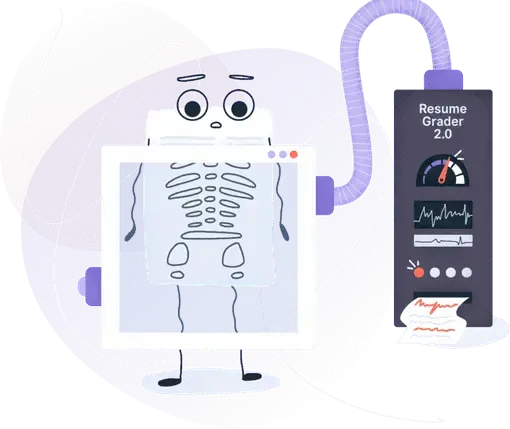Logistics Skills: Example Usage on Resumes, Skill Set & Top Keywords in 2025
Including logistics expertise on your resume suggests to recruiters your ability to manage complex systems with precision, highlighting your problem-solving skills and attention to detail. Dive into our guide to find inspiration and fresh ways to present your skills effectively on your resume.


Is your resume ATS-friendly?
Drop your resume here or upload a file to find out if the skills in your resume are readable by an ATS.
Logistics skills involve the effective coordination of resources, goods, and information as they move through a supply chain. It's about planning and implementing procedures to move products from sellers to buyers in a timely and cost-effective manner. When added to your resume, showcasing logistics skills can demonstrate your ability to manage supply chains, streamline operations, and maintain service quality. Including this skill set tells potential employers that you can help ensure that their products reach customers efficiently and that you can handle problem-solving in the transportation of goods.
However, simply adding "logistics" to your resume might not capture the attention of hiring managers if it's not presented in a way that relates to the particular job you're applying for. To stand out, it's better to provide context for your logistics experience by specifying achievements or quantifiable improvements you've made in past roles. Examples could be reducing delivery times, lowering transportation costs, or improving inventory management. Fleshing out your logistics skills with specific examples will make it clear how you can contribute to a new employer's operations.
In this article, you will learn:
- How to effectively add logistics skills to your resume, going beyond basic terminology.
- The common pitfalls of listing logistics as a skill and how to avoid them.
- Alternate terms and phrases to describe your logistics skills, increasing your appeal to employers.
Misusage of logistics on resumes
Logistics skills are essential in coordinating complex operations and ensuring the smooth flow of goods and services. However, when adding these skills to a resume, precision is key. Overstating expertise or misunderstanding the role of logistics can lead to credibility issues during an interview if you can't back up your claims with concrete examples. In particular, be careful not to exaggerate your abilities in the summary, experience, or achievements sections of your resume, as this can mislead potential employers.
- Summary Section: "Master of all logistics operations, with a flawless track record of managing supply chains in every industry known to man." This overgeneralization is unrealistic and sets expectations that cannot be met.
- Experience Section: "Single-handedly reconfigured the entire inventory system of a major corporation in just one week." This claim is likely exaggerated and ignores the teamwork and time typically necessary for such a task.
- Achievements Section: "Reduced shipping times from 2 weeks to 1 day without increasing costs." Without evidence, this achievement seems improbable and might be questioned by employers for its lack of detail and context.
How to demonstrate logistics skills on your resume
- Showcase your experience in supply chain management by detailing specific projects that improved efficiency, reduced costs, or enhanced delivery times.
- Highlight your proficiency with logistics software and tools by naming the platforms you’re skilled in and how they contributed to past successes.
- Demonstrate your ability to handle complex logistical challenges by listing any certifications or training you've completed relevant to the logistics sector.
- Include any quantitative results, like percentages of cost reduction or delivery speed improvement, to show concrete examples of your impact in previous roles.
- Emphasize your communication and coordination skills by describing situations where you successfully managed teams or collaborated with various departments to achieve logistics goals.
Example 1: Demonstrate logistics in the experience section
- •Oversaw the distribution of 10,000+ units monthly, optimizing route planning to reduce delivery times by 25%.
- •Negotiated contracts with 15 new suppliers, resulting in a 10% reduction in operational costs.
- •Implemented a real-time tracking system for shipments, improving customer satisfaction by 30% through enhanced transparency.
- •Led a team of 40+ staff, increasing productivity by 20% through strategic staff reallocation and training.
- •Managed inventory worth over $5M, reducing stock discrepancies to under 0.5% through improved auditing processes.
- •Championed the adoption of an automated sorting system, cutting processing times by 35%.
- •Analyzed and restructured the supply chain for a top-selling product line, boosting delivery efficiency by 15%.
- •Collaborated on international logistics projects, ensuring compliance with diverse trade regulations and reducing delays by 40%.
- •Streamlined supplier communication, shortening the supply replenishment cycle by 10 days.
This work experience section shows strong logistical skill with clear evidence:
- Including specific numbers and percentages connects tasks to measurable outcomes which highlight efficiency and improvement.
- Varying the language among bullet points helps to cover a range of skills and tasks, avoiding repetition and demonstrating versatility.
- Focusing on different aspects of logistics, such as route optimization, negotiations, system improvements, and compliance, shows a comprehensive skill set.
- Quantifiable achievements tied to business objectives like cost savings and customer satisfaction give clear indications of the applicant's impact.
- Reference to the use of innovative systems and strategic management positions the candidate as a forward-thinking professional.
Example 2: Demonstrate logistics in the summary section
- The summary clearly details the applicant's extensive experience (10 years) in a relevant field without resorting to overused terms.
- It references a significant professional accomplishment (project leading to a 30% efficiency increase), showcasing the impact of the applicant's work.
- Technical prowess with Excel is mentioned, which is a must-have skill for many logistical roles.
- The sentence structure is straightforward, avoiding clichés, yet demonstrates the applicant's proactive nature and alignment with excellence.
- The text is shaped to balance descriptive details with conciseness, maintaining clarity and readability without unnecessary jargon.
Example 3: Demonstrate logistics in the achievements section
- Titles are concise and directly related to logistics performance.
- Descriptions use specific numbers to show measurable results.
- Each entry is relevant, offering insight into the individual's abilities and accomplishments in real work situations.
- Uses simple language that's easy to understand, yet remains professional.
- The description avoids overused terms, focusing on clear, direct communication of accomplishments.
What are the relevant certifications for logistics skills on a resume
Obtaining a professional certification can provide you with the expertise necessary to excel in the logistics field.
The top 5 certifications for gaining logistics skills expertise:
Top skills people add together with logistics skill on resume:
Supply Chain Management
Inventory Management
Warehouse Operations
Transportation
Procurement
Distribution
Freight Forwarding
ERP Systems
Customs Compliance
Demand Planning
Problem Solving
Teamwork
Leadership
Organizational
Communication
Adaptability
Time Management
Attention to Detail
Decision Making
Critical Thinking
Negotiation
Most relevant jobs for logistics skills
- Supply Chain Manager - Oversees the entire supply chain process, from sourcing materials to delivering the final product to consumers.
- Logistics Coordinator - Handles the organization and movement of goods, ensuring that items are shipped and received on schedule.
- Inventory Manager - Manages and tracks stock levels, orders, and deliveries to prevent overstocking or stockouts.
- Fleet Manager - Supervises a fleet of vehicles, making sure they are maintained, efficiently routed, and compliant with regulations.
- Warehouse Manager - Runs day-to-day operations in a warehouse, including staff management, space organization, and safety procedures.
- Distribution Center Manager - Focuses on the flow of goods within a distribution center to optimize the delivery process to customers.
- Operations Manager - Manages the overall operations, often in a manufacturing or production setting, ensuring efficiency and productivity.
- Procurement Specialist - Sources and acquires goods and services for an organization while negotiating contracts and managing supplier relationships.
- Transportation Coordinator - Plans and oversees the transport of goods, making sure that shipments are cost-effective and timely.
- Logistics Analyst - Analyzes logistical problems and plans improvements to the system for better efficiency and lower costs.
Key takeaways
- Logistics skill enhances your resume by showing potential employers that you can efficiently manage goods, information, and resources.
- Avoid misusing this skill by understanding the actual needs of the job and accurately representing your abilities.
- Show this skill on your resume by providing concrete examples of past logistics achievements and quantifying your impact.
Make one that's truly you.




